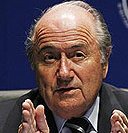 On Sunday night at Soccer City, Sepp Blatter cut a lonely and forlorn figure. In fact most of the television cutaways to the FIFA President throughout the tournament showed a surprisingly dour and solitary figure. Such a sight of the usually cheerful Blatter was all the more surprising considering this World Cup is his presidency’s greatest achievement.
On Sunday night at Soccer City, Sepp Blatter cut a lonely and forlorn figure. In fact most of the television cutaways to the FIFA President throughout the tournament showed a surprisingly dour and solitary figure. Such a sight of the usually cheerful Blatter was all the more surprising considering this World Cup is his presidency’s greatest achievement.
Despite many sideways looks from the global football community, the Swiss national was the first to believe in South Africa’s candidacy to host a successful World Cup.
Yet whatever the reasons and motivations, Blatter was right. A World Cup in South Africa worked.
All those doubts, suspicions and concerns were ultimately proven wrong. Possibly more so than any other, this World Cup was one of myths.
The myth that South Africa would be an unsafe host. The myth that the Jabulani ball would be an unmitigated disaster. The myth that this would be a boring World Cup because Brazil v Portugal was a relatively uninspiring dead rubber.
The myth that Joga Bonito even exists any more. The myth that the stadiums wouldn’t be ready. The myth that Australia would beat Germany (46,00 people voted in a Fairfax poll on the topic with 75% voting that they would). The myth that South Africa’s infrastructure would go into meltdown. And most importantly of all the myth that an octopus can predict the future, clearly he in fact determines it.
While everyone has their interpretation, the overwhelming sense is this World Cup was a success. So much so that South Africa is now being touted as “plan B” for Brazil 2014 (good to see we’ve learned nothing from this experience eh?).
But I’d warn you to be wary of the reports you read. Too many journalists spent the whole tournament cooped up in the comfort of South Africa’s most cosmopolitan city, Cape Town, to fully comprehend what the World Cup experience was really like.
Down on the ground in the mining town of Rustenburg or for the “average” South African in dwindling heartland towns like Kimberley, the World Cup was an entirely different beast.
Be cautious of claims from jaded journalists who were torn on whether they wanted the Socceroos to find success or whether they’d prefer to return home early, and don’t waste time on those who weren’t even in South Africa but decide to wax lyrical on the country based on hear-say.
There’s even cause to query those of us who actually managed to get out of the city the side they were reporting on was based in.
In just under six weeks I’ve driven around 9,000 kilometers, been to World Cup host cities, small provincial towns that put up teams during the tournament and stunning coastal spots that had nothing to do with the World Cup but were a joy no less. Yet don’t take my word as gospel either.
This is just my experience in South Africa.
World Cups, like anything stay true to the tried and true mantra of “you only get out of them, what you put in”.
I went into this World Cup simply with hope. Hope that myself and everyone else would be safe, hope that the Socceroos would do well (because in my heart of hearts I didn’t believe in Verbeek’s system) and hope that I’d enjoy myself.
Only the Socceroos left me hanging.
Of course the experience of traveling around a country working and also enjoying what’s on offer as a fan and tourist differs to those who spent their whole time here slaving away. Most of all though my World Cup experience is different to those back home who got up in the middle of the night to follow the tournament.
When you’re sacrificing sleep and have work the next day, a tight 1-1 draw doesn’t have the same pull. All of a sudden the fascinating tension isn’t quite so absorbing.
So, as South Africa moves from enjoying the present to contemplating a World Cup-less future, a tournament many tried to spruik as “nation-defining”, what next for the host nation?
I’ve read and heard all sorts of different ideas over the last days and weeks from South Africans keen to prolong the increase in national pride.
One of those came from a marketing company suggesting Football Friday, where employees around the country are allowed to wear football colours to work at the end of each working week, be replaced with Fly the Flag Friday.
The truth is such seemingly superficial ideas won’t matter though. Slowly things in South Africa will return to normal.
The government will continue to try and keep wages low so companies can employ as many people as possible, the various ethnic groups will continue to hold one another in mild but gradually evaporating suspicion and the country’s natural beauty will remain breathtaking.
In 2004 when it was announced that South Africa would host the 2010 World Cup far too many South Africans were brain washed into thinking this would help bring their country’s poorest communities out of the mire. This was apparently going to be the tournament in which everyone became wealthy.
But as the last players, journalists and fans depart the Rainbow Nation, this World Cup, just like all the others, made a lot of people happy, mildly entertained a number more and helped a few rich people get even richer.
Just another one of those busted World Cup myths.





























































































